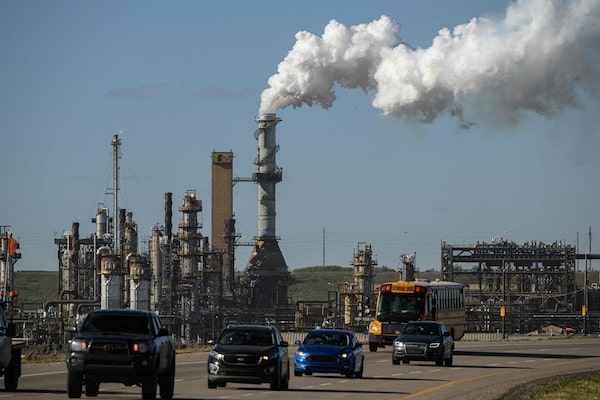
The world’s energy systems have been rerouted and reshaped over the past 12 months,ED JONES/AFP/Getty Images
Deborah Yedlin is president and chief executive officer of the Calgary Chamber of Commerce.
In the year since the last iteration of the world’s largest energy conference, held in Houston, energy markets have been in turmoil, punctuated by the very real tension between the issue of energy security – which, before Feb. 24, 2022, most people had only read about and not experienced – and the imperative to decrease carbon emissions.
That tension is not being resolved. If anything, it gets worse as countries and companies fail to agree on a common path forward that will ensure the production of energy that is sustainable, affordable and reliable. Instead, the targets established for both energy security and de-carbonization may not be realistic, especially when considering the substantial incentives required to encourage investment. And that’s in addition to the geopolitics of energy, which have changed dramatically owing to Russia’s invasion of Ukraine and continuing tensions between the U.S. and the countries that comprise the Organization of the Petroleum Exporting Countries.
All of this is going to make this year’s CERAWeek, presented by S&P Global, very interesting. The combination of more than 7,000 delegates, and the largest cleantech presence to date, means the issues of energy security and climate change will be threaded into every conversation.
Canada is in the mix, but not exactly with the voice it should have, given our resources. As the world adjusts to the new order of supply and demand, we need to think about Canada in the global context. Do we have a moral imperative to “get out of our way” and move ahead with resource development that would take pressure off world markets? One could argue that our inability to find a way to agree on climate goals and the fiscal mechanisms to support the attaining of said goals is exacerbating global energy security challenges.
Think about how the export of Canadian liquefied natural gas could displace emissions generated by coal-fired power – not just because natural gas generates half the emissions of coal, but also because the emissions associated with the production of Canada’s natural gas are amongst the lowest in the world. Contrary to what some might think, there is a strong business and climate case for the export of Canadian LNG. And lots of it.
As this year’s CERAWeek gets under way in Houston, it’s unfortunately without significant political presence from Canadian elected officials – save for Alberta’s Energy Minister Peter Guthrie, his Ontario counterpart Todd Smith, and Calgary Mayor Jyoti Gondek. The world’s global energy players will therefore discuss and debate the challenges and opportunities for the sector, against a backdrop of geopolitical tensions, without Canada effectively at the table. While there will be a significant presence from Alberta’s energy sector, including those from the Pathways Alliance and a number of cleantech companies, both government and business need to be present, in order to develop policy that is in sync with where the world is going. There is too much at stake to think this can be done without listening to how others are solving the same problem, together.
Up for discussion – much like last year – will be energy security and climate change, with technology and innovation figuring prominently. And part of that conversation will address the impact of the U.S. Inflation Reduction Act (IRA), which leapfrogged the U.S. from being in the game with its 45Q incentives, to becoming a global juggernaut for attracting investment for decarbonization projects – leaving every other jurisdiction in the dust, trying to figure out how to match it.
Including Canada.
Even if we could find a way to be as competitive as the U.S. and its IRA, we still need an efficient regulatory and permitting process that provides certainty and clarity in terms of timelines. We can talk all we want about opportunity, our world-class geology and carbon-capture technology – but without the timely, even expedited, approval of projects, this country won’t be able to take advantage of a generational opportunity to create economic value by decarbonizing the production and use of energy. This applies to all associated resource development and is very relevant in the critical-minerals conversation that is just beginning.
Over the past 12 months, the world’s energy systems have been rerouted and reshaped. Energy companies have continued to evolve and adapt to this changing landscape, with the goal of providing the world’s growing population with clean, reliable and affordable energy. As price takers in the global environment, and as a country that does really well in all the aspects of ESG (environmental, social and governance) metrics, Canada has a golden opportunity to be a leader in the energy evolution and revolution, developing technologies that attend to the twin imperatives of energy security and climate change. But we need to be competitive – and the conversations this week are going to underscore the gaps Canada needs to address, so that we don’t miss the moment.